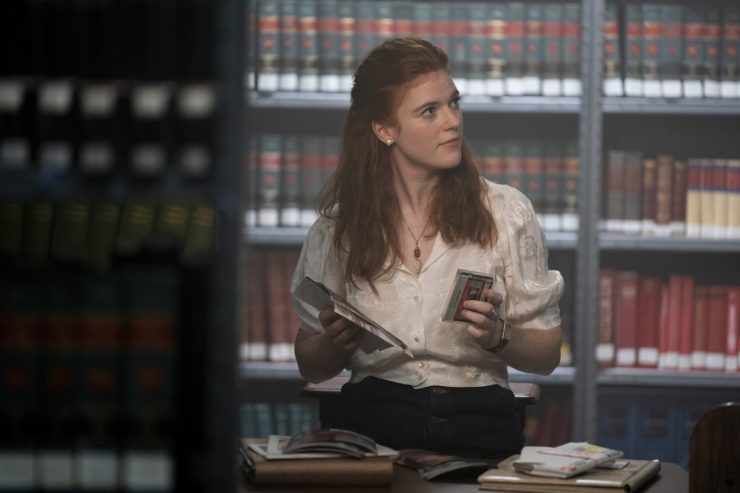So… it would seem that I’m in the minority for really enjoying Steven Moffat’s adaptation of The Time Traveler’s Wife. This is not the first time I’ve championed something other critics have panned, but I do want to clarify what I like about it. Because listen, this is not going to bring together an incredible fandom like Our Flag Means Death or even demonstrate the near-perfection of a book adaptation like Station Eleven. But it’s engaging twenty-year-old source material in a new way, and it’s clear that Moffat has been waiting a long time to do this. So that’s what has enraptured me with each episode, on both first watch and rewatch.
I also appreciate how episodic it is; last week was the first date that Henry messes up, while this week’s second date has Henry getting his first lesson in actually being vulnerable with his future wife, by way of some Moffat cleverness.
Dates and Times
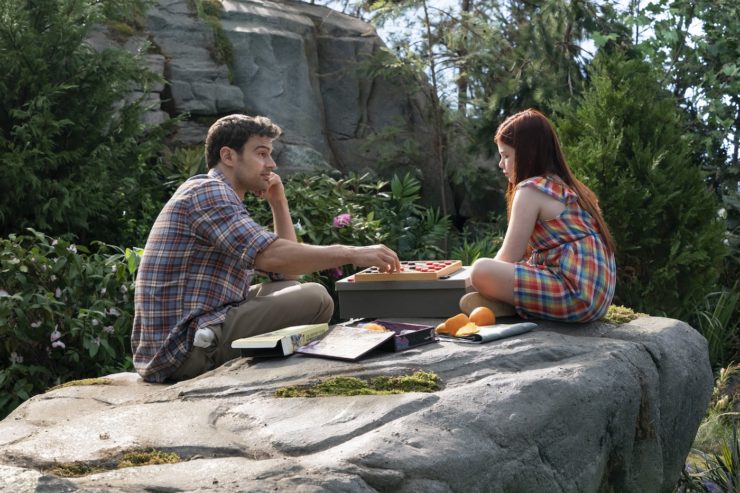
In the past, Young Clare wants to know why Older Henry is sad, but that’s not for him to tell her. Instead, that answer will come out on their second date in 2008, which starts with Clare calling Henry an asshole, still pissed about the whole girlfriend thing while also pushing back against the notion that she maybe doesn’t actually have any free will in all of this. That is, every decision she tries to make winds up being the decision they already made: getting off the train, going to one café over the other, and eventually settling for a stroll through Chicago before Henry has the bright idea to bring her to the library where they first met… so she can meet his mother.
Love Quotes
Clare to Henry: “My libido formed around you. You are everything you conditioned me to want.” Oof.
Henry to Clare: “The opposite of being an asshole is caring.”
O Henrys
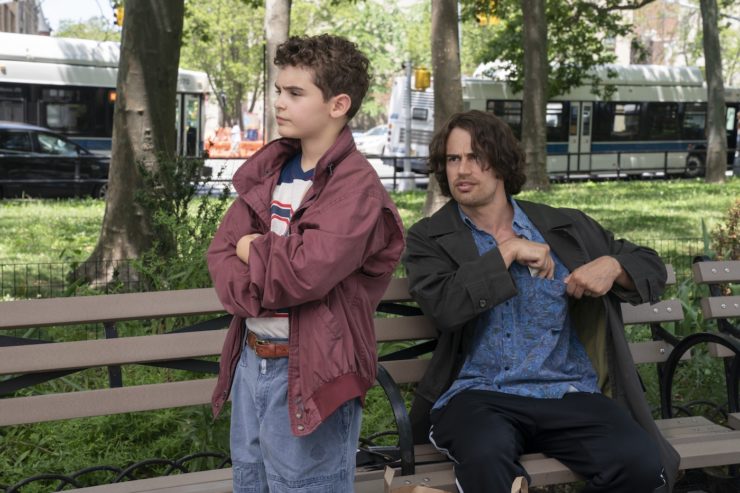
Similar to last week’s layering of moments (Henry and Clare’s first meeting triggering him to go back in time and set into motion events with various younger selves of both of them), this adaptation establishes that certain moments in Henry’s life draw him in with a gravitational pull. That is, multiple versions of him to pivotal, stressful memories that he can’t just recall, he is forced to relive.
No surprise, the primary one is Christmas—his mother’s death, adapted gruesomely from the book, with a touch of Final Destination by way of the ominously rattling sheet of metal on the back of the car ahead of the DeTambles’. But even those movies don’t repeat their gory kills over and over, to an almost comical extreme, the way this episode does; it shows how many different times and angles Henry was witnessed his mother’s decapitation, powerless to change the past.
Buy the Book
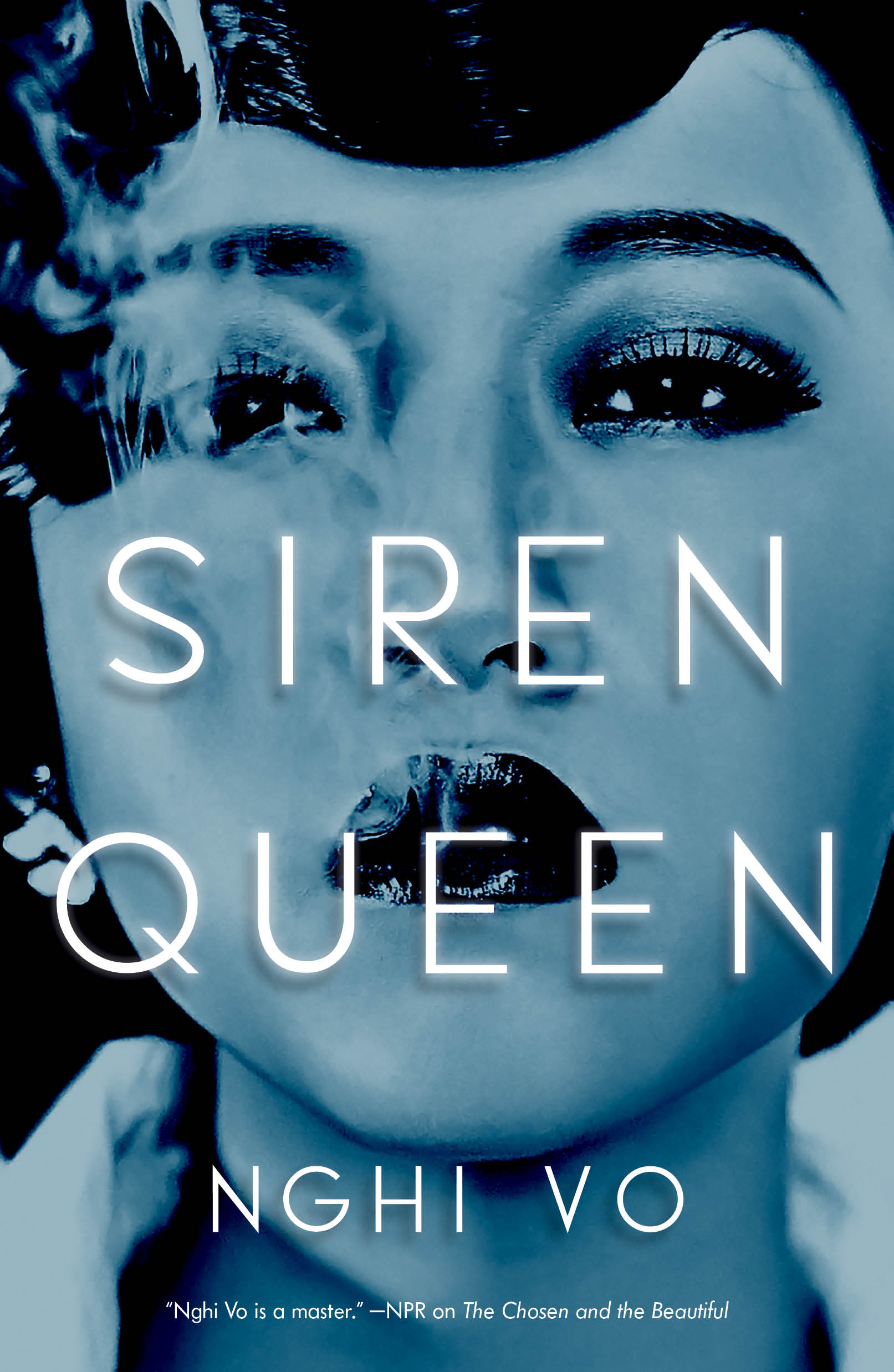

Siren Queen
The small comfort is that he’s not watching it alone; every time, the latest version of him to jump back to her death is joined by all of the past and future versions of himself. It’s the same for her funeral, though Young Henry doesn’t yet know that all of these other versions of himself are standing there in solidarity.
But we also get some scenes with just pairs of Henrys. At this point in time, Young Henry’s (8) main interactions are with present Henry (28), who has begun training him ever since he met Clare in 2008. While they’ve wound up in the same time period often enough for Young Henry to learn the ropes of stealing clothes and picking pockets, when the kid tries to connect with his grumpy mentor on an emotional level, Henry’s not having any of it. He won’t let the kid properly mourn his mother because what he had to learn at that age was that he would never be able to save her. He does try to impart the odd silver lining to Henry that because they’re time travelers, they can go back whenever they want to see their mother. Unfortunately, the kid who’s lost his mom less than a year ago can’t yet appreciate this; he’ll have to watch her die a couple dozen times before he’s able to jump to earlier in his parents’ courtship and take solace in seeing their lives before him.
What’s funny is contrasting Henry’s initial refusal to be vulnerable with his child self with the knowledge that two Henrys right in the middle of that age range have certainly gotten up close and personal. Henry does not leave us hanging with Older Henry’s “I fucked him, too” comment from the pilot by clarifying that yes, he did give in to the time-honored sci-fi temptation of “would you fuck your clone” by traveling back in time to receive a blowjob from himself when he was 16. (He will repeat this punchline, “I was sixteen,” many times over the course of the next five episodes.) And yes, my read of that scene is that it was a slightly older Henry’s idea to jump back in time so he could receive, as the Henry giving was still wearing his boxers when their dad walks in on them. This of course raises a bunch of questions, like, is this Henry’s first time? Not sure I’d call it “going gay for yourself” like Clare does, though it’s not exactly masturbation, either; the series definitely posits that each version of Henry, even if they’re separated by just a short time, counts as a different person based on life experience.
Anyway. Let’s move on to one of Henry’s more wholesome ideas.
Paradox of the Week
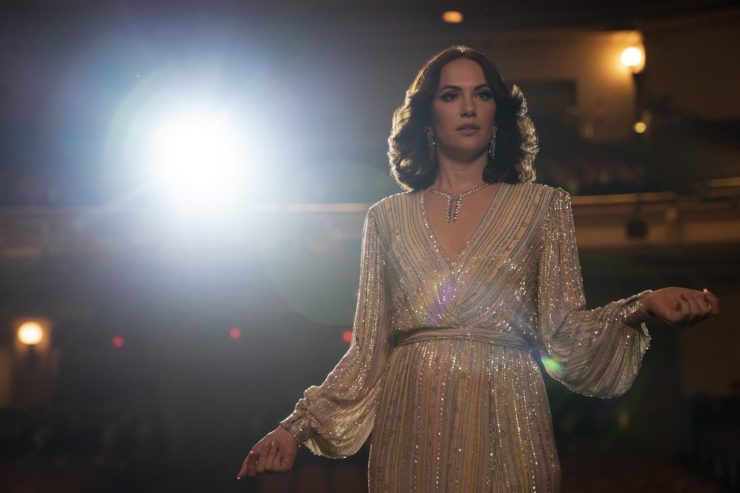
Who Henry does get to open up to about his mom is Clare. First, at lunch, it’s just the facts: Yes, his mother was a famous opera singer that her parents likely saw perform. Yes, she was decapitated on Christmas. Yes, he’s gotten to know her in reverse by visiting her when she met his father, when they had baby Henry, and all other times in between.
Talking about his mother makes Henry so emotional that he’s worried he’s going to jump back for the nth time to watch her die again. So instead, he has a spur-of-the-moment idea that simultaneously becomes a moment frozen in time for two decades: He pulls out a cassette recording of her final performance before her death, a performance he has never listened to. Knowing that his mother did cutesy audience Q&As, this Henry asks Clare to come up with the question she would ask Annette if she could have met her; he holds on to that question until whenever chance deems that he will jump back to that day, which turns out to be as Older Henry; and he gets his answer, which then sits on a tape, unlistened-to, until 2008.
Clare’s question: How do people get together? Annette’s answer:
“Isn’t all love doomed? … What they do is get together for a while. It is better to be happy for a little while, knowing you’re gonna lose it, than to be just OK for your whole life. … It’s always later than you think, and this is all the time you get.”
It’s clever without being (too) obnoxious, and it illustrates Henry’s outlook: To him, people are simultaneously alive and dead, and you never really lose someone. There’s always something new to experience with them, even for this cynical 28-year-old time traveler.
Beyond this bit of contained time travel, there’s the central truth of this episode: Clare doesn’t actually know Henry until he shares this sadness with her. So despite spending 14 years with Older Henry, Younger Clare doesn’t know a huge part of what shaped him until they’re existing in the same linear timeline. It emphasizes how this present time is what they need to focus on, not the underpinnings before or the future she’s pining for.
The Time Traveler’s Scribe
Moffat sure loves his analog media as a tool both for preserving the past and playing with how the present can change what has supposedly already been contained within that medium for decades. I would say that this bit with the cassette tape is a nod to the VHS fun in that iconic Doctor Who episode “Blink”… but there is some camcorder tomfoolery to come. And I’m not talking about the still-bad frame story. (Who is Clare talking to? I’ve already figured out who Henry must be addressing, but I’ll wait until that becomes more apparent to go into. But what’s Clare up to—recording some sort of self-help tapes for other eventual time travelers’ spouses?)
Foreknowledge
In Henry’s opening voiceover (sigh), we briefly see him pop into the future. It’s the middle of a school trip, where he spots a dark-haired girl who looks at him like she’s not so surprised to see a time traveler pop into existence. Spoiler text in white, but it’s their daughter, Alba.
By the Book
The credits are growing on me, only because there’s variation each time: It’s Clare running through the meadow and the woods to her and Henry’s clearing—which, yes, takes forever and is way melodramatic with that score—but the repetition makes sense, as it’s the one activity they’ve done the most together at this point. (Perhaps I’ll revise that once they have sex 152 times.) And maybe I’m giving Moffat and director David Nutter too much credit here, but the continued recreations of the book cover, with her changing shoes alongside his same pair of her dad’s pilfered brogues, get more and more forced, which would seem to point out the absurdity of posing them side-by-side as time goes on.
Other Notes
- I forgot to mention it in my review of the pilot, but did anyone else catch that one of Henry and Clare’s 152 dates is 9/11/2001? Ummm. I mean, he certainly would have been going through a lot of stress that day, but I’m not sure hanging out with a 13-year-old Clare would have been the remedy, either.
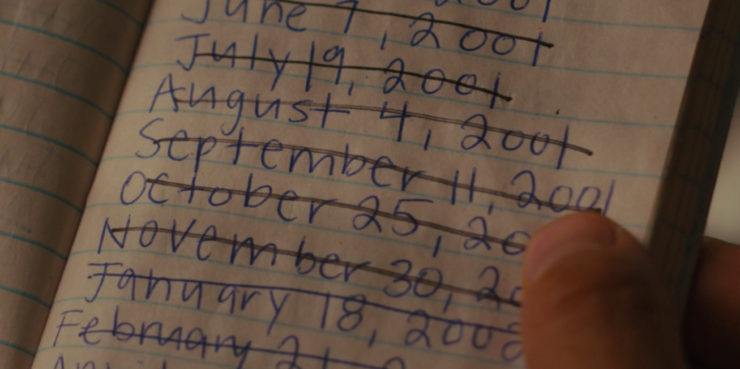
- At the library, Henry ponders whether he shows up in any of the thousands of books—if he got stuck somewhere in the past long enough to make it into history, or even just someone’s published anecdote. A recurring criticism I saw in some of the early reviews of the series was how unrealistic it would be for Henry to not have become some sort of urban legend (The Naked Time Traveler), though setting the present in 2008 about accounts for that. YouTube would only be a few years old, and viral videos would be rarer; Twitter would only just be starting.
Natalie Zutter would like you to know that her typo notes read “isn’t all love cooked” which, not wrong. Talk Time Traveler’s Wife with her here and on Twitter!










